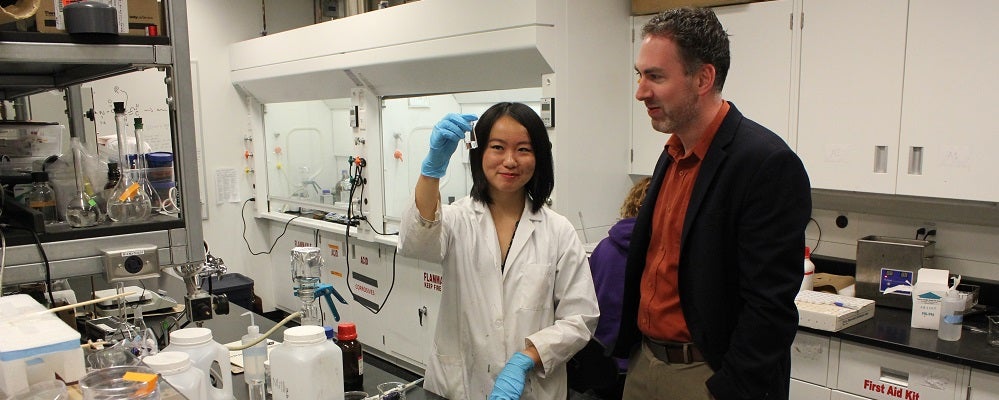
Professor Michael Pope is the lead applicant for an international collaboration that will help Canadian companies working with 2D materials compete on the international stage. An interdisciplinary team including members from the University of Waterloo and the University of Duisburg-Essen and RWTH Aachen University in Germany have worked to establish this initiative titled Scalable 2D Materials Architectures or 2D-MATURE which aims to create a talent pool of trainees that possess the technical and soft skills to take 2D materials from research labs to real-world industrial applications. The German researchers led by Professor Gerd Bacher were awarded an additional 7 million euros and will support international exchanges and summer schools for the Canadian students.
The project’s inspiration was the Nobel Prize-winning discovery of the 2D material graphene which is a one atom thick 2D crystal of carbon. The superior and sometimes unique properties of graphene and related 2D materials open up seemingly endless possibilities for industry. Many companies are keen to leverage these possibilities, but lack employees with the training to fully utilize the properties of 2D materials. Pope commented,
2D materials are a major tool in our toolbox of advanced materials. Unlocking their potential will enable technologies that haven’t been possible with other materials.
The initiative focuses on developing scalable materials synthesis routes and device fabrication strategies to build devices such as batteries and supercapacitors, light-emitting diodes, and light sensors. The scope of this project will further elevate the Department of Chemical Engineering’s expertise in key areas of research such as Advanced Materials, Green Reaction Engineering, Renewable Energy, and Electrochemical Energy Systems.
Pope and Professor Zhongwei Chen from Chemical Engineering will collaborate with the German teams and 6 other colleagues from Science and Engineering at the University of Waterloo to find improved ways to incorporate 2D materials more scalably into energy storage devices such as batteries and supercapacitors with efforts geared towards greener and more sustainable processes. Pope elaborated,
Chemical Engineering is all about scale-up, while we don’t usually focus on scaling up Nano-materials, this is becoming increasingly important and a skill in which chemical engineers are uniquely trained.
The initiative seeks to bridge the gap between research and commercialization. Trainees will receive instruction in project management, technical communication, intellectual property, commercialization, manufacturability, and life-cycle analysis addressing issues of sustainability. Training will include soft skills directly focused on how natural resource extraction impacts Canada’s Indigenous communities bringing in the critical need for social and environmental responsibility. Chemical engineering Professor Jason Grove has developed a simulation called “Cap and Trade Game” which will assist trainees in acquiring soft skills. Pope will be seeking applications from graduate students interesting in participating in this initiative. More information on the application process will be available on this website soon.
There is much interest and support for this leading-edge research. The collaboration is receiving 1.65 million dollars from the Natural Sciences and Engineering Research Council of Canada (NSERC) and 2.44 million dollars in additional funding from the University of Waterloo.